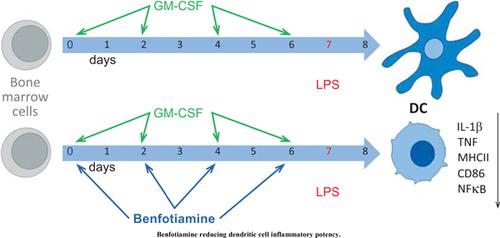Endocrine, Metabolic & Immune Disorders - Drug Targets ( IF 1.9 ) Pub Date : 2021-06-30 , DOI: 10.2174/1871530320999200905114135 Neda Djedovic 1 , Iva Božić 2 , Đorđe Miljković 1 , Irena Lavrnja 2

|
Background: Benfotiamine is a synthetic liposoluble derivative of vitamin B1 that has been shown to have anti-inflammatory properties.
Objective: To study the effects of benfotiamine on dendritic cells.
Methods: Dendritic cells were obtained from murine bone marrow precursor cells in the presence of GM-CSF. Benfotiamine was applied to the cell culture during the process of bone marrow cell differentiation into dendritic cells. Dendritic cells were stimulated with lipopolysaccharide (LPS) and expression of MHC class II molecules and CD86 was determined by flow cytometry, while levels of tumor necrosis factor (TNF) and interleukin (IL)-1β in cell culture supernatants were measured by ELISA. F-Actin, NF-κB and Nrf2 were visualized by immunofluorescent staining and microscopy.
Results: Benfotiamine potently reduced LPS-induced expression of MHC class II molecules and CD86, in addition to suppressing the release of pro-inflammatory cytokines TNF and IL-1β. It also prevented LPS-imposed morphological changes of dendritic cells, i.e. enlargement and intensified protrusions. The effects were paralleled with the reduction of NF-κB translocation to the nucleus, but not of Nrf2 activation inhibition.
Conclusion: Having in mind the importance of dendritic cells for the configuration of the immune response, our results imply that benfotiamine has the ability to regulate the immune response through inhibition of inflammatory properties of dendritic cells.
中文翻译:

Benfotiamine 降低树突状细胞的炎症效力
背景:苯磷硫胺是维生素 B1 的合成脂溶性衍生物,已被证明具有抗炎特性。
目的:研究苯磷硫胺对树突状细胞的影响。
方法:在GM-CSF存在下从鼠骨髓前体细胞获得树突细胞。在骨髓细胞分化为树突细胞的过程中,苯磷硫胺被应用于细胞培养物。树突细胞用脂多糖 (LPS) 刺激,MHC II 类分子和 CD86 的表达通过流式细胞术测定,而细胞培养上清液中肿瘤坏死因子 (TNF) 和白细胞介素 (IL)-1β 的水平通过 ELISA 测量。F-肌动蛋白、NF-κB 和 Nrf2 通过免疫荧光染色和显微镜观察。
结果:苯磷硫胺有效降低 LPS 诱导的 MHC II 类分子和 CD86 的表达,此外还抑制促炎细胞因子 TNF 和 IL-1β 的释放。它还阻止了 LPS 引起的树突细胞形态变化,即扩大和强化的突起。这些作用与 NF-κB 向细胞核易位的减少平行,但与 Nrf2 激活抑制无关。
结论:考虑到树突细胞对免疫反应配置的重要性,我们的结果表明苯磷硫胺能够通过抑制树突细胞的炎症特性来调节免疫反应。



























 京公网安备 11010802027423号
京公网安备 11010802027423号